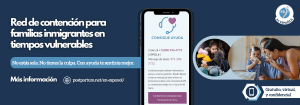By Erin Jones, LCMHC
As we continue to build awareness and support for perinatal mental health, we absolutely need to educate parents, providers, and the general public on perinatal Obsessive Compulsive Disorder (OCD). As a clinician and mom of two with lived experience, I am passionate about spreading awareness of this often misunderstood condition to keep parents from suffering in silence. First, here is a review of the definition of both OCD and perinatal OCD:
Obsessive Compulsive Disorder (OCD) —
a mental health condition characterized by the presence of both obsessions (unwanted thoughts, urges, or images) and compulsions to attempt to neutralize the distress that they cause. Though anyone can experience some intrusive thoughts and compulsive behaviors from time to time, OCD is often diagnosed when the symptoms are frequent, distressing, and impairing one’s life.
Perinatal or postpartum OCD —
when symptoms develop during pregnancy or after a child is born, likely due to hormonal changes and the stress of bringing a baby into the world. The obsessions and compulsions during this period of time often center around the safety and wellness of the baby, though not exclusively. According to the International OCD Foundation, perinatal OCD is present in 2-3% of all parents. However, it is estimated that the real numbers could be much higher due to factors such as lack of awareness and the presence of stigma towards OCD.
To better understand and provide support for this disorder, let’s clear up some of these misconceptions:
Misconception #1: Perinatal OCD obsessions are just “new parent worries”
Let’s start with an obvious statement: Many parents experience worries during the pregnancy and postpartum periods, especially when bringing home that first baby. It is common to wonder, “Are they eating enough?” “Are they breathing?” “Am I doing everything right?” New parents may also experience some scary thoughts, such as an image of making a mistake or dropping their baby. Because such worries are common during this major life adjustment, it is important to distinguish “new parent worries” from OCD symptoms, as the OCD symptoms can often go unnoticed.
Essentially, anyone can experience worries and intrusive thoughts (unwanted thoughts or images that are not congruent with one’s worldview). However, someone with OCD experiences obsessions that are not only unwanted and frequent, but also cause persistent anxiety and distress. Parents with OCD also engage in compulsions, which could include avoiding changing the baby, frequent checking of the monitor throughout the night, excessive research, and others. What makes the compulsions different from ordinary behaviors is that they are done in an attempt to decrease anxiety to the point that it interferes with life. Ultimately, compulsions keep someone in a cycle of anxiety that can become extremely debilitating and difficult to control.
Parents with OCD are not “just worrying too much” and may likely need more support beyond being encouraged to worry less.
Misconception #2: Postpartum OCD develops only right after childbirth
When there is a postpartum onset of OCD, it typically occurs within 2-8 weeks after delivery. However, other data involves up to the first year after delivery (International OCD Foundation). However, I’ve met individuals who have experienced postpartum OCD symptoms well after the first year of birth. In these cases, the fears focused on the child tend to gradually increase until they become more interfering in life. This is often called “Maternal OCD” to be more inclusive to moms and parents experiencing OCD symptoms at any point in parenthood. Whether or not OCD develops more rapidly in the early postpartum days or has a slower build-up, the importance of normalizing and providing resources for seeking treatment is just as vital.
Misconception #3: Postpartum OCD is related to postpartum psychosis
Postpartum OCD is often confused with postpartum psychosis. This confusion likely occurs because of stigmatic views of both disorders and misconceptions presented in the media. As a result, parents often worry about disclosing their intrusive thoughts to providers because they wonder if providers will misinterpret their fears as active threats to the baby (Cooke et al., 2024). Ultimately, postpartum OCD and postpartum psychosis are quite different from one another:
Postpartum OCD involves the presence of obsessions and compulsions that interfere with life. Individuals who struggle with OCD tend to have some insight, or awareness that their obsessions and compulsions cause distress and are likely irrational. For example, someone with OCD might experience a harm obsession in which they worry about accidentally dropping their baby. In an attempt to decrease the anxiety temporarily, they might avoid holding the baby, ask others for reassurance, etc. The fears are scary, but they tend to be separate from one’s worldview. Although residential centers exist for severe cases of OCD, it can typically be treated in outpatient counseling.
Postpartum psychosis, on the other hand, includes symptoms such as delusions, hallucinations, strange beliefs that are not based in reality, and rapid mood swings. Postpartum psychosis can also occur within the first year of birth, though it tends to have a quick onset (within the first two weeks after birth). Postpartum psychosis is treated as an emergency. For more information on postpartum psychosis, please click here.
Misconception #4: Only childbearing moms can develop perinatal OCD
Although perinatal OCD is most common in women who have previously been diagnosed with OCD, it does not discriminate against gender. Non-child-bearing parents (fathers, adoptive parents, same-sex parents, etc.) can experience perinatal OCD as well. Perinatal OCD can develop in any parent likely because of the combination of both hormonal and environmental factors. Expecting a child and being a new parent is a lot of adjustment and any parent that is struggling deserves proper support.
Misconception #5: Perinatal OCD reflects your worth as a parent
If you’re struggling with OCD, please know that you’re not a bad mom! All parents can experience scary thoughts. OCD intrusive thoughts tend to be ego-dystonic, meaning that they are inconsistent with someone’s identity and worldview. They also are generally involuntary, unwanted, and distressing. The obsessions have nothing to do with your worth or who you are as a person. Therefore, they do not disqualify you from being a parent.
If you relate to this article in any way, please know that you are absolutely not alone.
Getting help:
It is important to work with a specialist trained in evidence-based practices for OCD and who has experience with the ways that OCD can impact parents.
PSI Provider Directory
The International OCD Foundation also has a directory of specialists trained in treating OCD
PSI HelpLine (non-emergency): 1-800-944-4773
PSI Perinatal OCD support group for both Moms and Parents
Please check out Part 2 (coming soon) for more considerations on seeking treatment for perinatal and postpartum OCD.
References:
Cooke, D., McCarthy, R., Budd, S., Ordway, A., Roussos-Ross, D., Mathews, C., McNamara, J., & Guastello, A. (2024). Public Stigma and Recognition of Perinatal Obsessive-Compulsive Disorder. Journal of Obsessive-Compulsive and Related Disorders, 40. https://www.sciencedirect.com/science/article/abs/pii/S2211364924000022
Perinatal Resource Center (International OCD Foundation): https://iocdf.org/perinatal-ocd/
Salari, N., Shafari, S., Hassanabadi, M., Babajani, F., Khazaie, H., & Mohammadi, M. (2024). Global Prevalence of Obsessive-Compulsive Disorder in Pregnancy and Postpartum: A Systemic Review and Meta-Analysis. Journal of Affective Disorders Reports, 18. https://www.sciencedirect.com/science/article/pii/S266691532400132X
Resources for Postpartum Psychosis
PSI Provider Directory
Perinatal OCD and other peer support groups
Get Help










